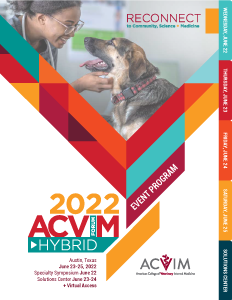Scientific Session
Oncology
Analyses of Canine Cancer Mutations and Treatment Outcomes Using Real-World Clinico-Genomics Data
.jpg)
Lucas Rodrigues, DVM, PhD
Head of Science
FidoCure/One Health Company
Madison, Wisconsin, United States
Primary Presenter(s)
Spontaneous tumors in dogs are highly similar to human cancers histologically, genetically, molecularly and clinically, but the similarities across species correlating biomarkers and outcomes are under investigation. In this study, we identified interesting findings validating concordance across the cancer journeys. This is important to deepen the field of comparative oncology and affirm spontaneous cancer in dogs as an ideal ‘model’ for precision oncology, building upon recent work in tumor biology concordance. Using the Next-Generation Sequencing (NGS) panel from FidoCure® Precision Medicine Platform associated with real-world clinical information and treatment outcomes from dogs, we systematically evaluated the prognostic effect of genomic alterations of 1108 dogs from 2702 dogs enrolled in the platform. Our analysis identified mutations in TP53 and PIK3CA as prognostic markers for poor survival in dogs with an overall survival hazard ratio (OS HR) of 1.56 and 1.34, respectively (P <0.01, P=0.03). On the other hand, KIT mutations were associated with good prognosis (OS HR 0.44, P=0.02). These results are aligned with human findings where TP53 is associated with poor prognosis across several types of cancer. Among tumor types, hemangiosarcoma, histiocytic sarcoma and lymphoma showed the worst survival outcomes, OS HR=2.06 (P <0.01), HR=1.54 (P=0.01) and HR=1.47 (P=0.01), respectively. Interestingly, we also identified that tumors carrying somatic BRAF mutant tumors had a better prognosis when treated with lapatinib (OS HR 0.10, P=0.02), ATM with vorinostat (OS HR 0.01 P=0.03), and FLT3 with trametinib (OS HR 0.03, P=0.02). To the best of our knowledge, this is the largest canine tumor clinical genomic dataset and analysis. Applying real-world evidence and data tools in the FidoCure® dataset, we successfully identified associations between gene mutations and survival and response to target therapy treatment. This study highlights how one health approach can improve not just R&D by using real-time data from pet dogs being treated for cancer but also improving canine oncology outcomes through precision medicine and target therapy.
Learning Objectives:
- The clinical genomic data analysis of canine tumors can bring benefits directly to dogs allowing a better therapeutic recommendation. It can also benefit human cancer research since canine models recapitulate human disease with intact immune systems and similar tumor genomic profiles, accelerating clinical studies of novel treatments that currently have significant barriers to study at scale.

